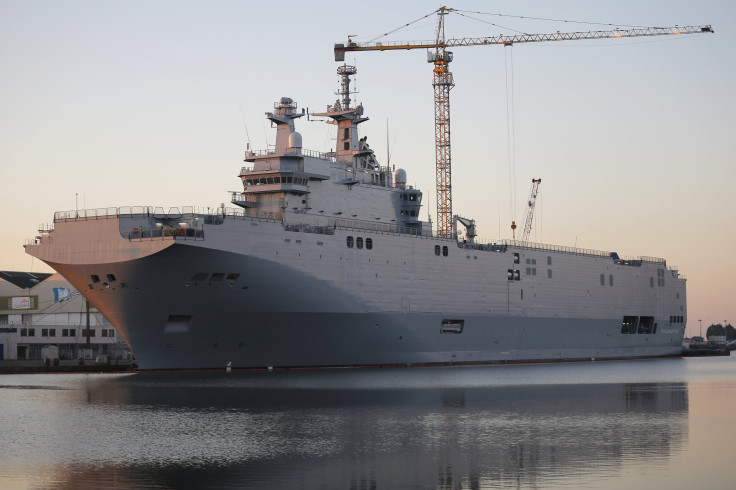French-Built Mistral Ships For Russia Could End Up In Canadian Hands

The Canadian military has emerged as a potential destination for the controversial French-built Mistral helicopter carrier ships, built for Russia and now at the center of an international row after France indicated it would not hand them over, in response to international indignation over Russian actions in Ukraine.
The possibility of a Canadian solution appeared in French media after French President François Hollande began a state visit to Canada this week. While Hollande has yet to make a decision on whether Russia has met the criteria to receive the ships, the presence in the French delegation to Canada of the diplomatic advisor to the chairman of DCNS, the company that manufactures the ships, offers the first indication that France could actively be seeking an alternative buyer.
While the $1.6 billion deal was signed in 2010, European relations with Russia deteriorated significantly in 2014 after the former Soviet country annexed Crimea and assisted pro-Russian separatist in the Ukrainian regions of Donetsk and Luhansk.
Sanctions imposed against Russia did not prohibit the final delivery of the two Mistral ships, but the French president decided that the deal should go ahead only if Russia meets two criteria: one, genuinely observing the ceasefire between the Ukrainian government and Russian-backed rebels that was signed in September; and, two, agreeing to formally resolve the conflict in Ukraine.
The idea of Canada buying the ships is not a new one. In May 2014, Canadian Senator Hugh Segal publicly suggested that France should sell to Canada instead of Russia. “Canada or NATO should buy these ships from France, leaving the Russians to await a further slot on the list, which good behavior would assure,” Segal said. “Being silent as French technology is afforded to an adventurist Russian military stance makes no sense at all.”
It’s unclear whether Hollande has decided if Russia has met the criteria. However, French Finance Minister Michel Sapin said at the end of October that Russia has not managed to meet the criteria and the ships should not be delivered. In the wake of those comments, the CEO of DCNS fired Yves Destefanis, the project manager responsible for the delivery of the ships to Russia, saying that he had “caused damaging consequences” to the company.
The Canadian link, first reported by French newspaper Le Monde on Monday, comes at a time when the Canadian military is aggressively modernizing its navy and coast guard. According to French and Canadian sources cited in Le Monde, the Canadian Armed Forces “are now determined to diversify their partners in defense matters,” moving away from their traditional U.S. suppliers.
Canada may seek to take the two ships for less than Russia paid for them, meaning a deal could be delayed for negotiations. But a deal is further complicated by two issues: The decision not to deliver the ships is a political one that DCNS has no say in. According to the company, the deal will go ahead with Russia; the state-owned Russian defense company Rosoboronexport has already been invited to the handover ceremony of the first ship, the Sevastapol, set for Nov 14. Second, should the ships be handed over to a different military, DCNS may be sued for breach of contract, which could force them to return the cash Russia paid upfront and face a possible fine.
© Copyright IBTimes 2024. All rights reserved.






















